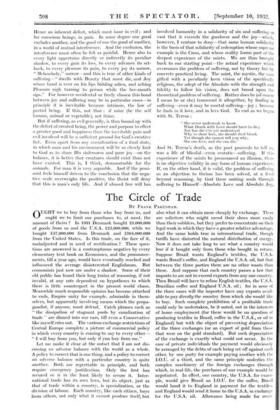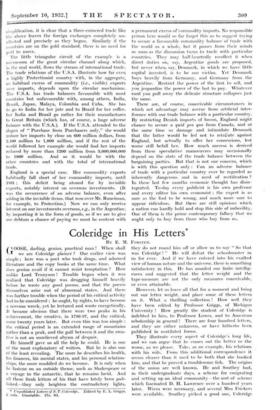The Circle of Trade
BY FRANK PAKENHAll.
OUGHT we to buy from those who buy from us, and ought we to limit our purchases to, at most, the amount of theirs ? In 1931 Denmark bought £9,000,000 of goods from us and the U.S.A. £25,000,000, while we bought £47,000,000 from Denmark and £104,000,000 from the United States. Is this trade, on the face of it, maladjusted and in need of rectification ? These ques- tions are answered in a contemptuous negative by every elementary text book on Economics, and the pronounce- ments, till a year ago, would have eventually reached and influenced the average disinterested Englishman. But economists just now are under a shadow. Some of their old public has found their long trains of reasoning, if not invalid, at any rate dependent on hypotheses to which there is little counterpart in the present world chaos. Meanwhile much responsible opinion has become attached to ends, Empire unity for example, admirable in them- selves, but apparently involving means which the propa- gandist, if anyone, must defend. Catch phrases such as "the dissipation of stagnant pools by canalization of trade" are dinned into our ears, till even a Conservative like myself cries out. The various exchange restrictions of Central Europe complete a picture of commercial policy in which every country is corning to say to every other- " I will buy from you, but only if you buy from me."
Let me make it clear at the outset that I am not dis- cussing an adverse balance with the world as a whole. A policy to correct that is one thing, and a policy to correct an adverse balance with a particular country is quite another. Both are regrettable in principle, and both require emergency justification. Only the first has secured or is in the least likely to secure it. Inter- national trade has its own laws, but its object, just as that of trade within a country, is specialization, or the division of labour. Each country, like each citizen, buys from others, not only what it cannot produce itself, but also what it can obtain more cheaply by exchange. There are solicitors who might mend their shoes more easily than their cobblers, but they prefer to concentrate on their legal work in which they have a greater relative advantage. And the same holds true, in international trade, though tariffs have distorted the natural distribution of energy. Now it does not take long to see what a country would lose if it bought only from those who bought in return. Suppose Brazil wants England's textiles, the U.S.A. wants Brazil's coffee, and England the U.S.A. oil, but that between the three parties there are no other wants than these. And suppose that each country passes a law that imports to are not to exceed exports from any one country. Then Brazil will have to refuse English textiles, the U.S.A. Brazilian coffee and England U.S.A. oil ; for in none of the three cases will the importer have any exports avail- able to pay directly the country from which she would like to buy. Such complete prohibition of a profitable trade could only be Undertaken, be it noted, not in the interests of home employment (for there would be no question of producing textiles in Brazil, coffee in the U.S.A., or oil in England) but with the object of preventing depreciation of the three exchanges (or an export of gold from those that were on the gold standard). But such depreciation of the exchange is exactly what could not occur. In the case of private individuals the payment would obviously be arranged by the debts of each being set off against each other, by one party for example paying another with the I.O.U. of a third, and the same principle underlies the complex machinery of the foreign exchanges through which, in real life, the purchases of our example would he negotiated. In effect, one country, the U.S.A.. for exam- ple, would give Brazil an I.O.U. for -the coffee, Brazil would hand it to England in payment for the textilec, and England would send it home to the U.S.A. in exchange for the U.S.A. oil. Allowance' being made- for over- simplification, it is clear that a three-cornered trade like the above leaves the foreign exchanges completely un- affected and precisely as they began. Similarly if the countries are on the gold standard, there is no need for gold to move.
The little triangular circuit of the examp'.e is a microcosm of the great circular channel along which, in the real world, flows the stream of international trade. The trade relations of the U.S.A. illustrate how far even a highly Protectionist country With, in the aggregate, an habitual excess of commodity (i.e., visible) exports over imports, depends upon the circular mechanism. The U.S.A. has trade balances favourable with most countries but unfavourable with, among others, India, Brazil, Japan, Malaya, Colombia and Cuba. She has to go to India for her jute and to Brazil for her coffee, but India and Brazil go rather for their manufactures to Great Britain (which has, of course, a huge adverse balance with the U.S.-A.). If the U.S.A. attended to the slogan of "Purchase from Purchasers only," she would reduce her imports by close on 600 million dollars, from 2,400 million to 1,800 million, and if the rest of the world followed her example she would find her imports reduced by more than 1200 million from 3,000,000,000 to 1800 million. And so it would be with the other countries and with the total of international trade.
England is a special case. Her commodity exports habitually fall short of her commodity imports, until 1931; This deficit being atoned for by invisible exports, notably interest on overseas investments. (It was the occurrence of an adverse balance, even after adding in the invisible items, that won over Mr. Runciman, for example, to Protection.) Now we can only receive interest on our investments overseas, e.g., in the Argentine, by importing it in the form of goods, so if we are to give our debtors a chance of paying we must be content with a permanent excess of commodity imports. No responsible person here would so far forget this as to suggest trying to secure a favourable commodity balance of trade with the world as a whole, but it passes from their minds as soon as the discussion turns to trade with particular countries. They may half-heartedly recollect it when direct duties on, say, Argentine goods are proposed, but never when, say, Denmark, in which we have little capital invested, is to be our victim. Yet Denmark buys heavily from Germany, and Germany from the Argentine. Restrict the power of the first to sell, and you jeopardize the power of the last to pay. Whatever card you pull away the delicate structure collapses just the same.
There are, of course, conceivable circumstances in which net advantage may accrue from artificial inter- ference with our trade balance with a particular country. By restricting Danish imports of bacon, England might chance to secure a quid pro quo from Canada, and at the same time so damage and intimidate Denmark that the latter would be led not to retaliate against England, but actually to offer her concessions, lest worse still befall her. How much success is derived from these speculative manoeuvres may occasionally depend on the state of the trade balance between the bargaining parties. But that is not our concern, which is with this question only : Can an adverse balance of trade with a particular country ever be regarded as inherently dangerous and in need of rectification ? In these last few - months economic thought has disin- tegrated. To-day every publicist is his own professor and every editor his own economist ; the expert is as sure as the fool to be wrong, and much more sure to appear ridiculous. But there are still opinions which A nation can hardly hold and stop this side of imbecility. One of them is the prime contemporary fallacy that we ought only to buy from those who buy from us.































 Previous page
Previous page